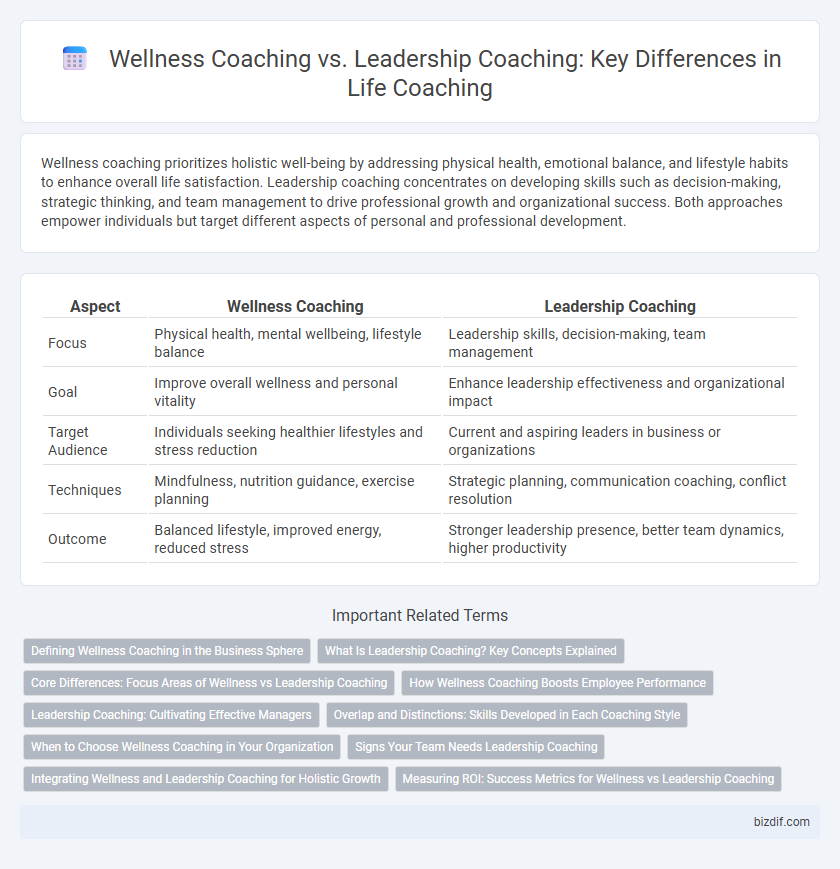Wellness coaching prioritizes holistic well-being by addressing physical health, emotional balance, and lifestyle habits to enhance overall life satisfaction. Leadership coaching concentrates on developing skills such as decision-making, strategic thinking, and team management to drive professional growth and organizational success. Both approaches empower individuals but target different aspects of personal and professional development.
Table of Comparison
| Aspect | Wellness Coaching | Leadership Coaching |
|---|---|---|
| Focus | Physical health, mental wellbeing, lifestyle balance | Leadership skills, decision-making, team management |
| Goal | Improve overall wellness and personal vitality | Enhance leadership effectiveness and organizational impact |
| Target Audience | Individuals seeking healthier lifestyles and stress reduction | Current and aspiring leaders in business or organizations |
| Techniques | Mindfulness, nutrition guidance, exercise planning | Strategic planning, communication coaching, conflict resolution |
| Outcome | Balanced lifestyle, improved energy, reduced stress | Stronger leadership presence, better team dynamics, higher productivity |
Defining Wellness Coaching in the Business Sphere
Wellness coaching in the business sphere centers on enhancing employees' physical, mental, and emotional well-being to improve overall workplace productivity and reduce burnout. This approach integrates stress management, nutrition, fitness, and work-life balance strategies tailored to individual needs within organizational goals. Unlike leadership coaching, which focuses on developing executive skills and decision-making capabilities, wellness coaching prioritizes holistic health as a foundation for sustained professional performance.
What Is Leadership Coaching? Key Concepts Explained
Leadership coaching focuses on enhancing an individual's ability to lead teams, make strategic decisions, and drive organizational success. Key concepts in leadership coaching include emotional intelligence, effective communication, decision-making skills, and transformational leadership techniques. This coaching style differs from wellness coaching by prioritizing professional growth, leadership presence, and performance optimization over personal health and lifestyle improvements.
Core Differences: Focus Areas of Wellness vs Leadership Coaching
Wellness coaching centers on improving physical health, emotional balance, stress management, and overall lifestyle habits to enhance personal well-being. Leadership coaching targets developing management skills, decision-making abilities, strategic thinking, and team leadership to drive professional success. The core difference lies in wellness coaching prioritizing holistic health, while leadership coaching emphasizes organizational influence and career growth.
How Wellness Coaching Boosts Employee Performance
Wellness coaching enhances employee performance by fostering physical health, mental resilience, and stress management, leading to reduced absenteeism and increased productivity. By addressing holistic well-being, wellness coaching creates a supportive work environment that motivates employees to maintain energy and focus throughout the day. This contrasts with leadership coaching, which primarily targets managerial skills and strategic decision-making rather than individual health and well-being.
Leadership Coaching: Cultivating Effective Managers
Leadership coaching centers on developing essential skills for effective management, including strategic decision-making, emotional intelligence, and team motivation. It empowers managers to navigate complex organizational dynamics and inspire high performance, fostering a culture of accountability and growth. By enhancing communication and conflict resolution abilities, leadership coaching transforms potential into impactful leadership, driving sustainable business success.
Overlap and Distinctions: Skills Developed in Each Coaching Style
Wellness coaching emphasizes developing skills in stress management, emotional regulation, and establishing healthy lifestyle habits to enhance overall well-being. Leadership coaching cultivates competencies in strategic decision-making, effective communication, and team management to drive organizational success. Both coaching styles share a focus on goal setting, self-awareness, and accountability but differ in their specific application and target outcomes.
When to Choose Wellness Coaching in Your Organization
Wellness coaching is ideal when your organization aims to improve employee health, reduce stress, and enhance overall well-being, leading to increased productivity and reduced absenteeism. It focuses on individual lifestyle changes, mental health support, and sustainable habits that contribute to a healthier workforce. Choosing wellness coaching supports creating a resilient organizational culture that prioritizes holistic employee care over performance metrics alone.
Signs Your Team Needs Leadership Coaching
Frequent communication breakdowns, declining productivity, and low employee morale are clear signs your team needs leadership coaching. Struggles with conflict resolution, lack of clear vision, and difficulty adapting to change highlight leadership gaps best addressed through targeted coaching. Wellness coaching focuses on individual well-being, while leadership coaching hones strategic skills imperative for effective team management and performance optimization.
Integrating Wellness and Leadership Coaching for Holistic Growth
Integrating wellness and leadership coaching fosters holistic growth by addressing both personal well-being and professional effectiveness, enhancing overall performance. Wellness coaching emphasizes mental and physical health optimization, while leadership coaching concentrates on strategic decision-making and team management skills. Combining these approaches cultivates resilient leaders who maintain balance, boost productivity, and inspire healthier workplace cultures.
Measuring ROI: Success Metrics for Wellness vs Leadership Coaching
Wellness coaching measures ROI through improvements in employee health indicators, reduced absenteeism, and enhanced overall well-being, quantifying success with metrics such as biometric data and stress reduction levels. Leadership coaching evaluates ROI by tracking leadership effectiveness, team performance outcomes, and achievement of strategic goals, often using 360-degree feedback and productivity benchmarks. Comparing these metrics highlights wellness coaching's impact on personal health and engagement, while leadership coaching drives organizational performance and leadership development.
Wellness coaching vs Leadership coaching Infographic

 bizdif.com
bizdif.com